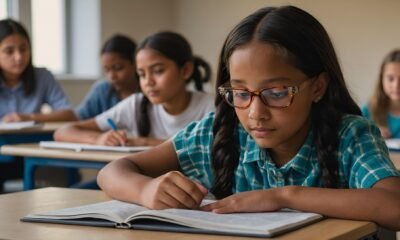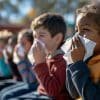Education
Countries in South Asia should reopen schools, consequences could last decades: UNICEF
India and other countries in the South Asia region should fully reopen schools to provide uninterrupted education for hundreds of millions of children, says UNICEF. It warned that consequences could last for decades. Schools in the South Asian region have been shut due to the ongoing COVID-19 pandemic, with an average of 31.5 weeks between March 2020 and August 2021.
A UNICEF and UNESCO report ‘Situation Analysis on the Effects and Responses to COVID-19 on the Education Sector in Asia’ urges governments in the region to reopen schools as soon as it is safe to do so. With the world in the last quarter of 2021, many children are facing an unprecedented second year of school closures as new variants of the coronavirus spread across the region.
The associated consequences of such continuous school closures are staggering and include learning loss; mental distress; missed school meals and routine vaccinations; heightened risk of drop out of structured education; increased child labor; and increased child marriage. Many of these dire consequences are already affecting millions of children, and many will continue to be felt in the years to come.
Marcoluigi Corsi, UNICEF Regional Director a.i. for East Asia and Pacific, says the impact that the disruption of education services has had on children, particularly the most vulnerable, cannot be overlooked. “When schools remain closed, children miss out on the biggest opportunity to learn and develop to their full potential. The future of an entire generation is at stake; therefore, we need every effort to ensure a safe reopening of schools as soon as possible.” Corsi believes learning loss will be difficult to overcome.
George Laryea-Adjei, UNICEF Regional Director for South Asia, says governments, partners and the private sector will need to work together, not only to get the strategies and levels of investment right, but to build more resilient, effective and inclusive systems that are able to deliver on the promise of education as a fundamental human right for children – whether schools are open or closed.
The report states that education budgets in the region will need to increase by an average of 10% to catch up with such losses if Asia is to reach the education targets of the UN 2030 Agenda’s Sustainable Development Goals in the next nine years.
Also Read: Gujarat High Court slams AMC for trying to dictate what people should eat/a>
Shigeru Aoyagi, Director of UNESCO Bangkok, acknowledges that major efforts are needed to mitigate the learning loss of those children who return to school in the post-COVID recovery phase. “We must also remember that 128 million children in Asia were already out of school at the onset of the pandemic; this figure represents roughly half of all out-of-school children globally. This is a learning crisis which needs to be addressed.”










































